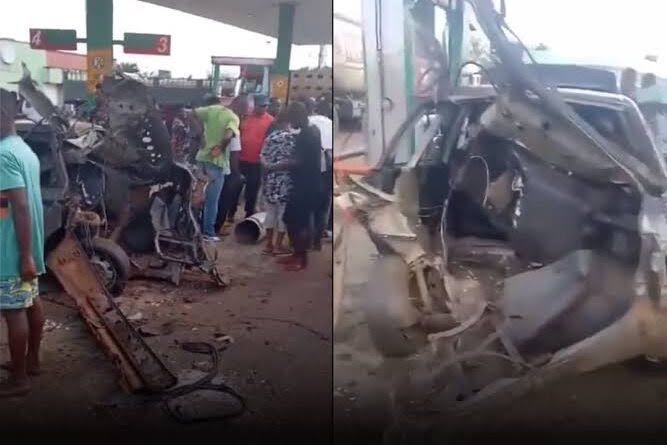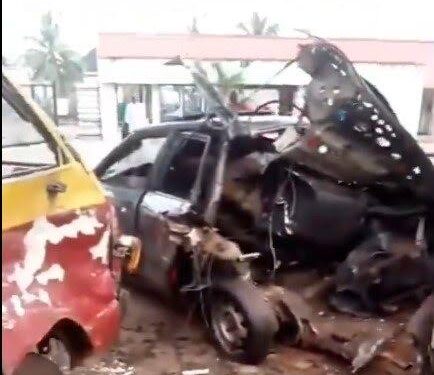The recent explosion involving a vehicle at a NIPCO CNG station in Aduwawa, Benin City, has sparked serious concern regarding the safety standards of CNG-powered vehicles in Nigeria. The Presidential CNG Initiative (PCNGI) issued a statement addressing this unfortunate incident, which occurred on Wednesday, October 16, 2024, leaving three individuals severely injured.
In its statement released on Friday, the PCNGI emphasized that the vehicle involved in the explosion was illegally modified and not approved for use with compressed natural gas (CNG). This revelation raises critical questions about vehicle safety regulations and the importance of compliance with established standards.

Reports indicate that the explosion was linked to a cylinder that had been improperly fabricated by a welder. Disturbingly, this unapproved cylinder was utilized in the vehicle, ultimately leading to the explosion. The welder has since turned himself in to the authorities, which may aid in the ongoing investigation.
Eyewitness accounts detail the chaos following the explosion. Among the injured is a motorist who suffered serious eye injuries. Two other individuals are currently undergoing treatment at the University of Benin Teaching Hospital, Ugbowo. One victim, a woman, sustained horrific injuries, with her stomach reportedly ripped open due to the blast. Another individual had to undergo amputation of a foot as a result of the explosion.
“The Presidential CNG Initiative notes the unfortunate incident that involved an illegally modified vehicle at a NIPCO CNG Station at Aduwawa in Benin City on Wednesday, October 16, 2024,” the statement read. The initiative expressed deep concern for those affected, stating, “The PCNGI commiserates with those injured in this avoidable incident and is thankful that no lives were lost.” This sentiment reflects the organization’s commitment to ensuring the safety of all stakeholders involved in the CNG ecosystem.

In light of this incident, the PCNGI highlighted the critical importance of proper handling and usage of hydrocarbons. They noted that “the safe handling of all hydrocarbons is critical to their safe use,” emphasizing the need for rigorous safety standards in the industry. A detailed investigation is currently being conducted by the police, regulatory authorities, and the management of NIPCO, with the PCNGI coordinating efforts to ensure a thorough examination of the circumstances surrounding the explosion.
The statement also pointed to the upcoming Nigeria Gas Vehicle Monitoring System, which is being developed in partnership with organizations such as SON, NMDPRA, NADDC, and FRSC. This system aims to identify and eliminate bad actors within the CNG ecosystem, reinforcing safety measures to ensure that CNG remains a safer, cheaper, cleaner, and more reliable fuel source. The initiative urged all stakeholders to fully cooperate with the new regulatory framework and ensure compliance, stating, “Only accredited conversion centres must be patronized and safe handling of CNG, just like petrol, ensures the safety of all.”

Further elaborating on the incident, the PCNGI reported that the cylinder involved was found to be a substandard unit, fabricated and not designed for use with CNG. “Unfortunately, the cylinder installed in the vehicle — later identified as a fake and fabricated, substandard unit not designed for CNG — exploded after filling with just around 4 SCM of gas,” they stated. This shocking revelation underscores the importance of stringent regulations and the dangers posed by unauthorized modifications.
Following the incident, the driver reportedly fled the scene, highlighting another layer of concern regarding accountability in such situations. While thankfully no fatalities were recorded, the injuries sustained by the victims have raised alarms about the need for greater awareness and adherence to safety standards within the CNG vehicle sector.
In a proactive move, the Federal Government has issued a warning to motorists to avoid using unaccredited centres for converting their vehicles from fuel to gas. This advisory is crucial as it aims to prevent future incidents and ensure the safety of all drivers and passengers.
As investigations continue and regulatory frameworks are developed, the hope remains that such tragic incidents can be prevented in the future, ensuring a safer and more reliable environment for all CNG users in Nigeria.




































